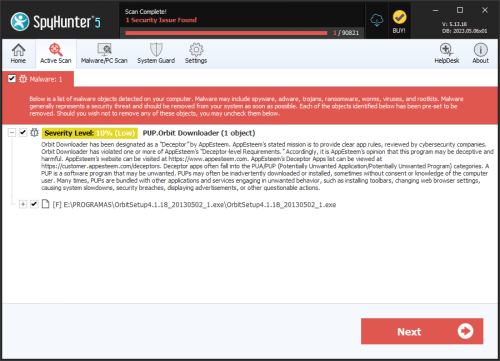Orbit Ransomware
The Orbit Ransomware is a threatening software variant that has recently caught the attention of cybersecurity researchers. This type of ransomware poses a significant threat to individuals and organizations by encrypting their files and demanding a ransom for decryption. Due to the wide range of affected data, ransomware threats are among the most threatening malware out there. Attacks of this type could cause significant operational disruptions and massive financial losses.
Table of Contents
How Does Orbit Ransomware Operate?
- File Encryption and Renaming: The Orbit Ransomware operates by infiltrating the victim's computer and systematically encrypting files. It renames the encrypted files by appending a string of random characters, likely representing the victim's unique ID, along with the '.orbit' extension. This alteration makes it evident that the files have been compromised and are no longer accessible in their original form.
- Ransom Note: After encrypting the files, the Orbit Ransomware generates a ransom note, typically named 'README.TXT.' This note is placed in directories containing encrypted files and serves as a communication medium between the attackers and the victims. The ransom note warns victims that their files have been enciphered and can only be recovered by purchasing a decryption tool from the attackers. It provides a Tox ID for further communication and offers to decrypt one file for free as proof of their ability to restore the data.
Instructions and Threats in the Ransom Note
The ransom note from Orbit includes several advisories aimed at preventing the victims from taking actions that could further jeopardize their data. It explicitly advises against:
- Renaming or editing encrypted files.
- Using third-party software for decryption.
- Contacting third parties for assistance.
These warnings are meant to dissuade victims from attempting to recover their files through alternative means, which the attackers claim could lead to data loss or further tactics.
Network Access and Data Disclosure Threats
In addition to the advisories, the ransom note from the Orbit Ransomware includes a more severe threat: the attackers claim to have access to the victim's network. They threaten to sell or disclose the victim's data if they do not make contact within 24 hours. This tactic adds pressure on the victims, making them more likely to comply with the ransom demands out of fear of data breaches and further complications.
The Challenges of Decrypting the Files Encrypted by Ransomware
In most cases, decrypting the files encrypted by ransomware like Orbit is only possible with the specific decryption tools possessed by the cybercriminals behind the attack. The rare exceptions involve threats with serious vulnerabilities in the ransomware or the availability of third-party decryption tools that may allow for file recovery without paying the ransom.
The Risks of Paying the Ransom
Paying the ransom demanded by cybercriminals is generally not advisable. There is no way to know that the cyber crooks will provide the decryption tool even after payment. Moreover, fulfilling the ransom demands only encourages the continuation of such harmful activities, potentially funding further attacks on other victims.
Essential Security Measures to Protect Against Ransomware
- Regular Backups: One of the most effective defenses against ransomware is maintaining regular backups of needful data. Backups should be stored offline or on secure cloud services to ensure they are not accessible to ransomware. In the event of a ransomware infection, having up-to-date backups allows for data recovery without needing to pay the ransom.
- Anti-Malware and Security Software: Installing and regularly updating anti-malware and security software can help detect and prevent ransomware infections. These tools can provide real-time protection and remove malicious software before it has the chance to encrypt files.
- User Education and Awareness: Educating users about the risks of ransomware and best practices for avoiding infections is crucial. This includes being cautious with email attachments, not downloading software from untrusted sources, and recognizing phishing attempts.
- Network Security Measures: Implementing robust network security measures, such as firewalls, intrusion detection systems, and regular security audits, can help protect against ransomware attacks. Ensuring that systems and all software have the latest security patches also minimizes vulnerabilities that ransomware can exploit.
In conclusion, while the Orbit Ransomware poses a significant threat to data security, adopting comprehensive security measures can mitigate the risk and impact of such attacks. Regular backups, robust security software, user education, and a well-defined incident response plan are all critical components of a strong defense against ransomware.
The ransom note dropped on the devices infected by the Orbit Ransomware is:
'YOUR FILES ARE ENCRYPTED!
Your files, documents, photos, databases and other important files are encrypted.
If you found this document in a zip, do not modify the contents of that archive! Do not edit, add or remove files from it!
You are not able to decrypt it by yourself! The only method of recovering files is to purchase an unique decryptor.
Only we can give you this decryptor and only we can recover your files.To be sure we have the decryptor and it works you can send an message uTox: 4CEEB4949763512B2B6603DA8CA79291D041B2DEF5A8A39D7F491B1F84A4E85C0BEC17F728A7 and decrypt one file for free.
But this file should be of not valuable!Do you really want to restore your files?
TOX: 4CEEB4949763512B2B6603DA8CA79291D041B2DEF5A8A39D7F491B1F84A4E85C0BEC17F728A7How to use tox:
Download a uTox client: hxxp://utox.org
Run it
Add our TOX id:
4CEEB4949763512B2B6603DA8CA79291D041B2DEF5A8A39D7F491B1F84A4E85C0BEC17F728A7Attention!
Do not rename or edit encrypted files and archives containing encrypted files.
Do not try to decrypt your data using third party software, it may cause permanent data loss.
Decryption of your files with the help of third parties may cause increased price (they add their fee to our) or you can become a victim of a scam.
We have been in your network for a long time. We know everything about your company most of your information has already been downloaded to our server. We recommend you to do not waste your time if you dont wont we start 2nd part.
You have 24 hours to contact us.
Otherwise, your data will be sold or made public.'

